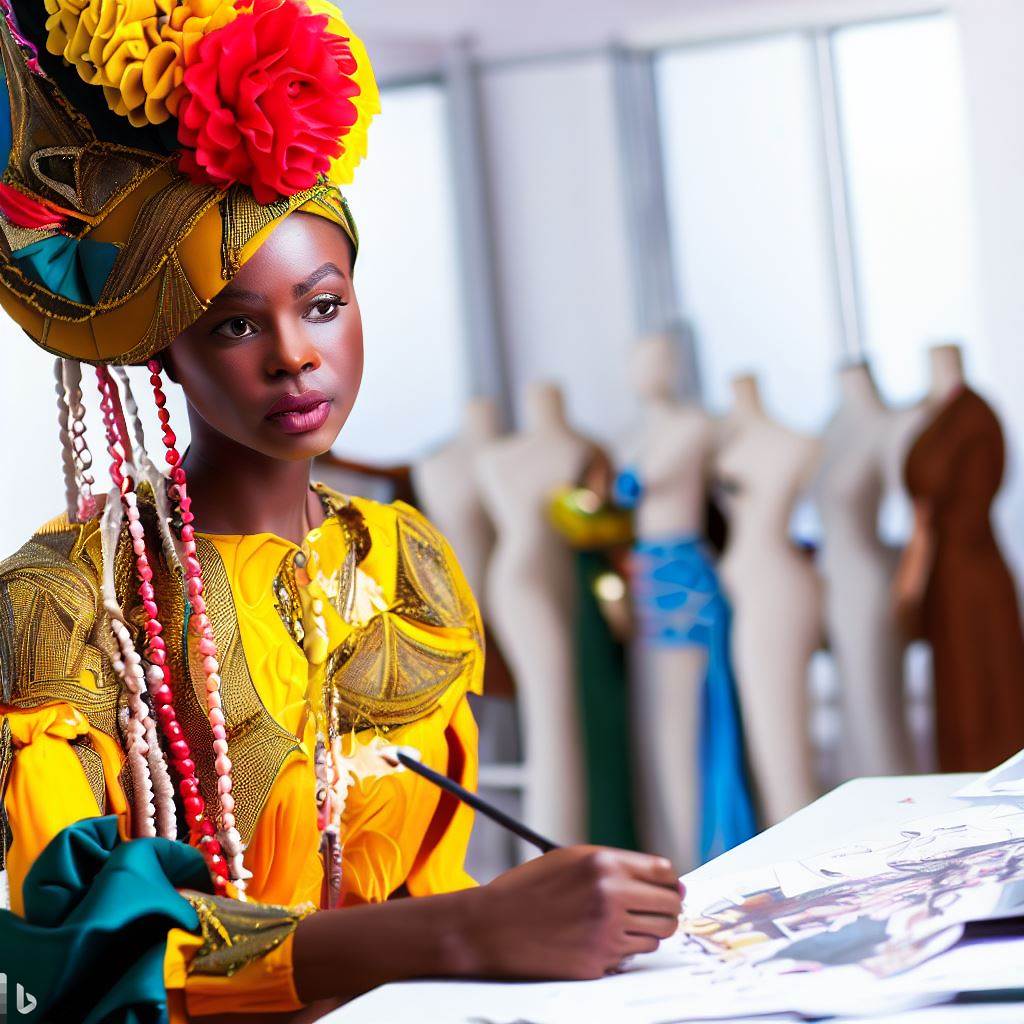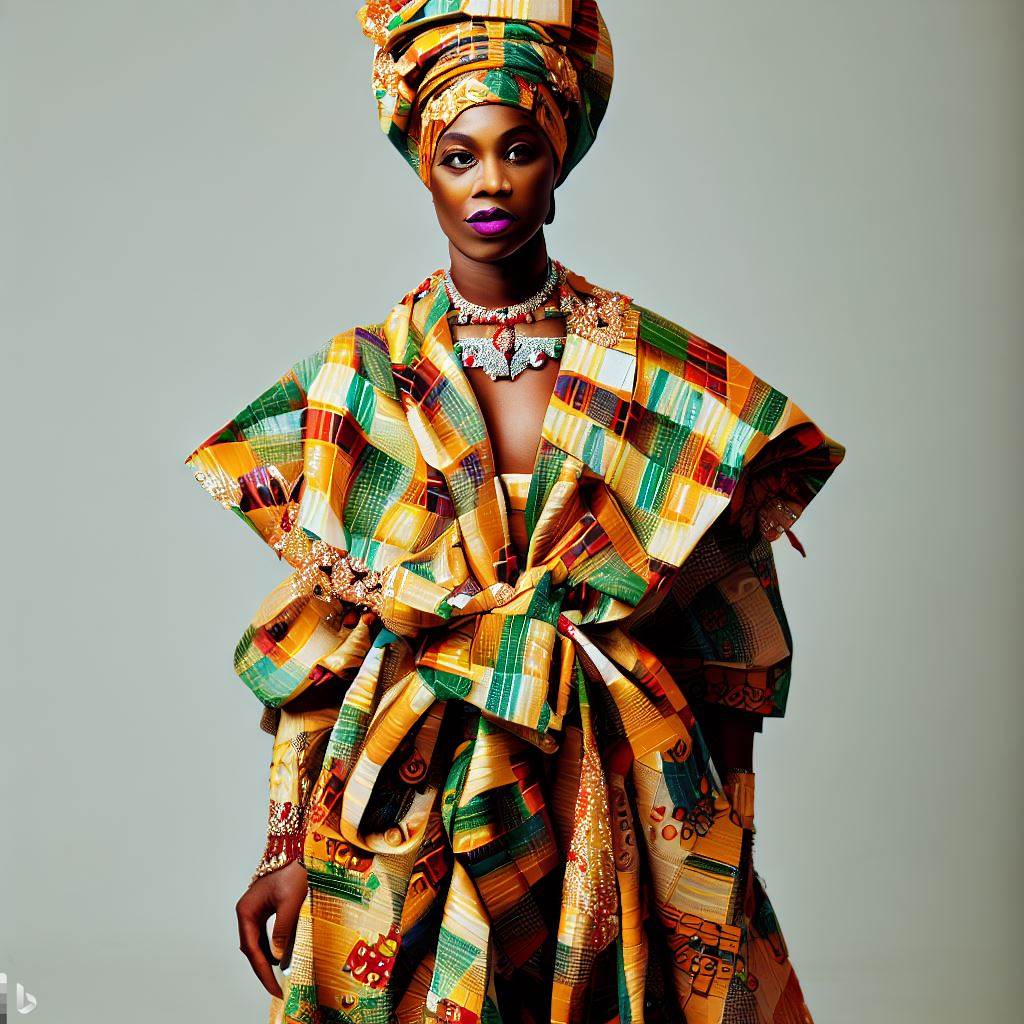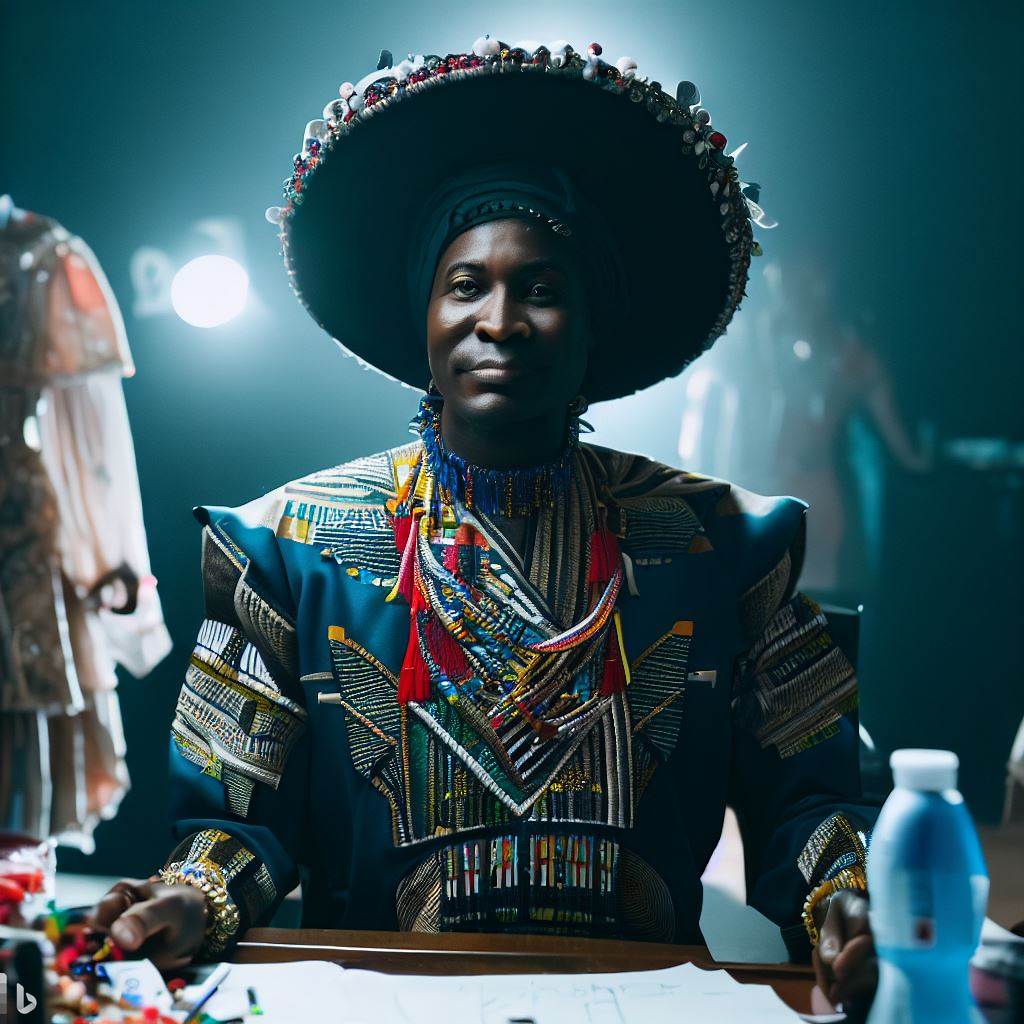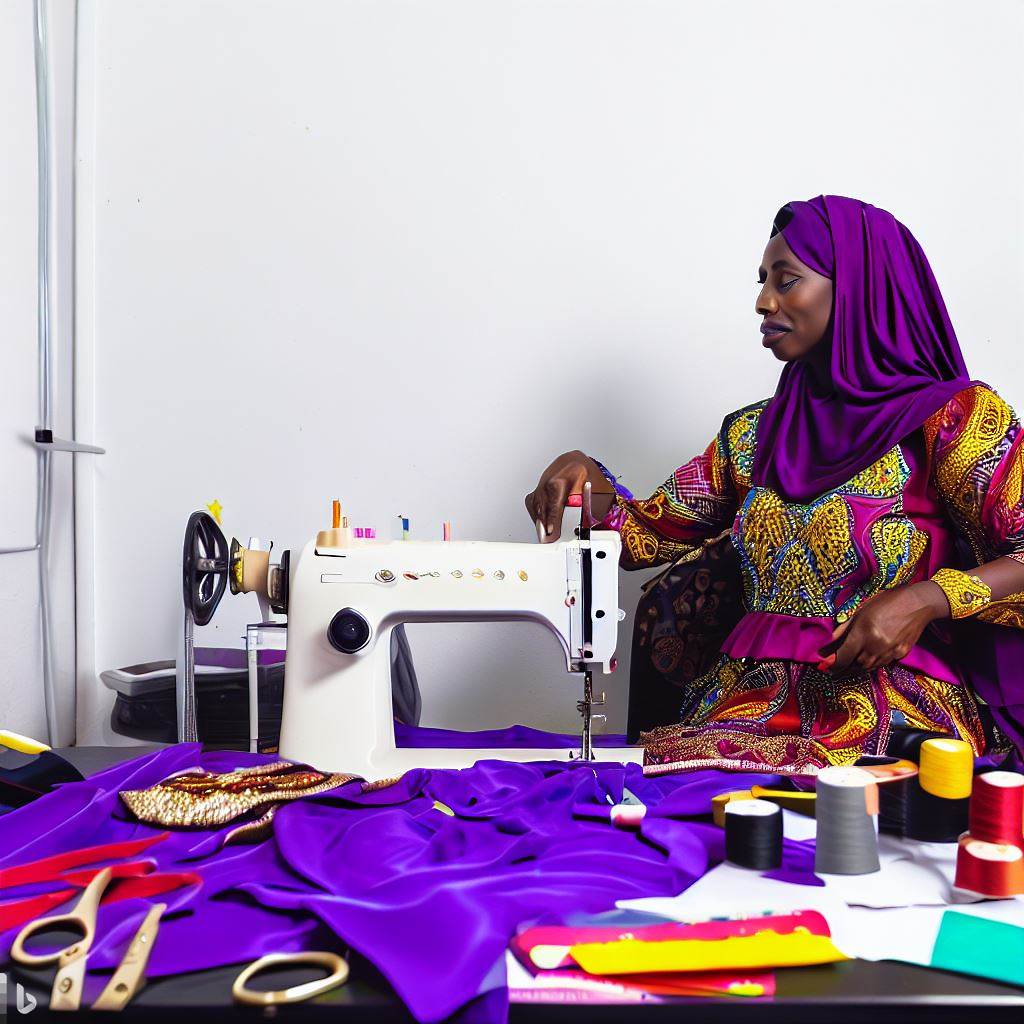Introduction
Briefly introduce the topic of costume design education in Nigeria
Costume design education in Nigeria is a growing field that offers creative opportunities.
State the purpose of the blog post
The purpose of this blog post is to explore the top schools in Nigeria for costume design education.
Importance of Costume Design Education in Nigeria
Discuss the significance of costume design in theater and film industry
Costume design plays a vital role in bringing characters to life in the theater and film industry.
It is an essential aspect of visual storytelling, creating a visual language that enhances the narrative and helps the audience understand the characters and their motivations.
Through costumes, the audience gains insights into the characters’ personalities, social status, and historical context.
In theater, costumes not only help depict the time period and setting but also convey the characters’ emotions, relationships, and transformations.
They contribute to the overall aesthetic of the production and can evoke specific moods or atmospheres.
Costume designers select vibrant colors, luxurious fabrics for royal characters to show wealth. They opt for muted tones, simpler designs for portraying poverty.
Similarly, in the film industry, costume designers work closely with directors and production designers to create costumes that align with the overall visual style of the film.
Every element of the costume, from its color and texture to its silhouette and accessories, is carefully considered to portray the character’s identity and the story’s themes.
Whether it’s a period drama or a futuristic sci-fi film, costumes transport the audience to different eras and worlds, enhancing the cinematic experience.
The role of costume designers in visual storytelling
Costume designers are storytellers themselves, collaborating with directors, actors, and other members of the creative team to visually interpret characters and narratives.
They begin their process by reading scripts, researching historical periods, and engaging in discussions to understand the world of the story and the characters’ backgrounds.
Using their knowledge of fashion history, textiles, and design principles, costume designers create sketches and renderings to present their ideas.
They conduct fittings with actors, ensuring their costumes fit both aesthetically and functionally.
Costume designers also collaborate with other departments, such as hair and makeup, to ensure a cohesive visual representation of the characters.
Costume designers go beyond just creating clothes; they use their expertise to contribute to character development and storytelling.
They make choices that support the actors’ performances, helping them embody their characters convincingly.
The costumes become an extension of the characters’ identities, reflecting their personalities, social status, and cultural backgrounds.
Moreover, costume designers play a crucial role in creating a sense of authenticity and historical accuracy.
Whether it’s a period piece or a film set in a specific cultural context, they meticulously research and recreate costumes that reflect the era and traditions.
This attention to detail enhances the audience’s immersion in the story’s world, making it more believable and relatable.
Costume design education is of great importance in Nigeria’s theater and film industry.
It enables aspiring designers to understand the significance of costumes in visual storytelling, and equips them with the necessary skills to bring characters to life through clothing.
Highlighting costume design’s role in narrative expression and character development acknowledges costume designers’ essential contribution to immersive experiences.
Read:Nigeria’s Literary Festivals: A Haven for Writers
Factors to Consider When Choosing a Costume Design School in Nigeria
In order to pursue a successful career in costume design, it is crucial to choose the right school that will provide you with the necessary knowledge and skills.
Here are some key factors to consider when selecting a costume design school in Nigeria:
Location and Accessibility
The location of the school is an important factor to consider.
It should be easily accessible, well-connected, and have a conducive environment for learning and creativity.
Look for schools situated in major cities with a thriving arts and entertainment industry.
Reputation and Credibility of the Institution
Research the reputation and credibility of the institution you are considering.
Look for schools with a strong track record in costume design education and alumni who are successful professionals in the field.
Check for accreditations and affiliations with relevant professional organizations.
Course Curriculum and Specialization Options
Evaluate the curriculum offered by the school. It should cover the fundamentals of costume design, including costume history, costume construction techniques, and design principles.
Additionally, see if the school offers specialization options or advanced courses in specific areas of costume design that align with your interests and career goals.
Facilities and Resources Available for Practical Training
Check the facilities and resources available for practical training.
A costume design program should have well-equipped costume studios, sewing labs, and access to a wide range of fabrics, materials, and equipment.
Look for opportunities to work on real-world projects and productions.
Alumni Network and Industry Connections
Consider the strength of the school’s alumni network and industry connections.
A strong network can provide valuable career opportunities, internships, mentorship, and industry exposure.
Look for schools that have partnerships with theaters, production companies, and costume designers in the industry.
Financial Considerations, including Tuition Fees and Scholarship Opportunities
Lastly, consider the financial aspects of attending the school. Look into the tuition fees and whether the program offers any scholarship opportunities or financial aid.
Evaluate the cost-benefit ratio and determine if the investment is reasonable and worthwhile for your future career prospects.
Choosing the right costume design school in Nigeria is a crucial step towards a successful career in this creative field.
Consider location, reputation, curriculum, facilities, alumni network, and finances.
Make an informed decision for a thriving costume design future.
Read:Local Vs International Publishing: A Nigerian Perspective
Top Costume Design Schools in Nigeria
Instituto Di Moda Burgo Nigeria: Overview, Location, and Key Highlights
Instituto Di Moda Burgo Nigeria is a renowned school for costume design education in Nigeria.
With its campus located in Lagos, the fashion capital of Nigeria, it offers top-notch courses in fashion design, including costume design.
The school provides a comprehensive curriculum that covers various aspects of costume design, including pattern making, garment construction, fabric selection, and fashion illustration.
Students have the opportunity to specialize in costume design, allowing them to focus on their specific interest in this field.
Instituto Di Moda Burgo Nigeria has produced notable alumni who have excelled in the costume design industry both locally and internationally.
The school also collaborates with well-known fashion brands and industry experts to provide students with practical experience and exposure to real-world costume design projects.
What sets Instituto Di Moda Burgo Nigeria apart is its emphasis on hands-on training and practical skills development.
Students have access to well-equipped workshops and state-of-the-art facilities, enabling them to hone their craft and creativity in costume design.
Deola Sagoe Fashion Institute: Overview, Location, and Key Highlights
Located in Lagos, Deola Sagoe Fashion Institute is a prestigious school that offers a range of fashion design courses, including costume design.
Established by renowned Nigerian fashion designer, Deola Sagoe, the institute has gained a reputation for excellence in training aspiring costume designers.
The institute’s curriculum includes in-depth courses in costume design theory, history, and technique.
Students have the flexibility to choose their specialization options within costume design, such as period costumes or contemporary theatrical costumes.
Deola Sagoe Fashion Institute boasts a network of talented alumni who have made a name for themselves in the costume design industry.
The institute also collaborates with leading fashion houses and industry professionals to provide students with valuable industry exposure and internship opportunities.
One unique aspect of the Deola Sagoe Fashion Institute is its integration of traditional Nigerian elements into costume design.
Students are encouraged to explore and incorporate Nigerian culture and heritage into their designs, giving their creations a distinct and authentic identity.
Rhoda Michaels Fashion Academy: Overview, Location, and Key Highlights
Rhoda Michaels Fashion Academy, located in Lagos, is a renowned institution that offers comprehensive fashion design programs, including a specialization in costume design.
With its state-of-the-art facilities and experienced faculty, the academy provides students with a solid foundation in costume design.
The academy’s curriculum covers various aspects of costume design, including concept development, pattern making, and costume construction.
Students have the opportunity to specialize in areas such as film and theater costumes or avant-garde costume design.
Notable alumni from Rhoda Michaels Fashion Academy have successfully established themselves in the costume design industry, both nationally and internationally.
The academy also collaborates with industry professionals and fashion brands to provide students with practical industry experience and networking opportunities.
One of the strengths of Rhoda Michaels Fashion Academy is its focus on creativity and innovation in costume design.
Students are encouraged to think outside the box and push the boundaries of traditional costume design, resulting in unique and groundbreaking creations.
GMYT Fashion Academy: Overview, Location, and Key Highlights
GMYT Fashion Academy, situated in Lagos, is a leading institution that offers comprehensive fashion design programs, including a specialization in costume design.
The academy is known for its commitment to excellence and cutting-edge education in the field of fashion and costume design.
The academy’s curriculum covers various areas of costume design, including costume illustration, garment construction, and fabric manipulation.
Students have the opportunity to specialize in specific costume design genres, such as bridal or fantasy costumes.
GMYT Fashion Academy has a strong network of alumni who have made significant contributions to the costume design industry.
The academy also collaborates with industry professionals and fashion brands to provide students with real-world exposure and internship opportunities.
One of the unique aspects of GMYT Fashion Academy is its focus on entrepreneurship in costume design.
Students are equipped with business skills and knowledge, preparing them to establish their own successful costume design ventures.
Overall, these top costume design schools in Nigeria provide students with the necessary skills, knowledge, and industry exposure to excel in the field of costume design.
Whether it is Instituto Di Moda Burgo Nigeria, Deola Sagoe Fashion Institute, Rhoda Michaels Fashion Academy, or GMYT Fashion Academy, aspiring costume designers have a range of excellent educational options to choose from in Nigeria.
Read:Examining the State of Digital Writing in Nigeria

Application and Admission Process
General Application Requirements and Deadlines
Before applying to a costume design program in Nigeria, it is essential to understand the general application requirements and deadlines.
These requirements may vary slightly between institutions, so it is important to thoroughly research each school’s specific guidelines.
Typically, applicants are required to submit their completed application forms before the stated deadline. It is crucial to adhere to this deadline to avoid any complications with the application process.
Other common requirements include official transcripts from previously attended schools, letters of recommendation, and a personal statement.
Additionally, many programs require applicants to pay an application fee, which covers the administrative costs associated with reviewing applications.
It is advisable to gather all necessary documents well in advance of the deadline to ensure a smooth application process.
Specific Requirements for Costume Design Programs
Costume design programs may have specific requirements that applicants must meet. These requirements often focus on the applicant’s artistic abilities and potential for creativity within the field of costume design.
Some programs may request a portfolio of previous work, showcasing the applicant’s skills in designing and constructing costumes.
This portfolio should include sketches, photos, or any other relevant visual representations of the applicant’s work.
In addition to the portfolio, programs may also require a written statement outlining the applicant’s passion for costume design and their future career goals in the industry.
This statement should convey the applicant’s dedication, motivation, and understanding of the field.
Tips for Preparing a Strong Application Portfolio
Creating a strong application portfolio is crucial for aspiring costume design students. Here are some tips to help applicants stand out:
- Showcase a diverse range of skills, including sketching, sewing, and costume construction.
- Include examples of both original designs and recreations of existing costumes to demonstrate versatility.
- Highlight any relevant experience, such as participation in theater productions or fashion shows.
- Ensure the portfolio is well-organized and visually appealing.
Importance of Interviews or Auditions
In some cases, costume design programs may require applicants to participate in interviews or auditions.
These evaluations give the admissions committee a chance to assess the applicant’s skills, passion, and suitability for the program.
During interviews, applicants may be asked about their design process, inspirations, and goals. It is essential to prepare thoughtful responses that showcase both technical proficiency and creative thinking.
Auditions may involve showcasing sewing skills, costume fitting abilities, or even presenting a finished costume.
Being well-prepared and showing confidence can greatly enhance an applicant’s chances of being accepted into a program.
Process of Admission and Acceptance
Once all applications have been reviewed, the admissions committee will select the most promising candidates for admission.
Successful applicants will receive an acceptance letter, which may include additional information regarding enrollment procedures and academic requirements.
It is crucial for accepted students to confirm their acceptance by the specified deadline and fulfill any additional requirements, such as submitting a deposit or providing further documentation.
Unsuccessful applicants may be placed on a waiting list or kindly informed of their rejection.
In such cases, it is advisable to seek feedback from the admissions committee to understand any areas of improvement for future applications.
Overall, the application and admission process for costume design programs in Nigeria requires careful attention to detail, creativity, and a passion for the craft.
By meeting the specific requirements and showcasing individual skills and experiences, aspiring costume designers can increase their chances of receiving a coveted admission offer.
Read:Spotlight on Nigeria’s Tech Editors: A Closer Look
Scholarships and Funding Opportunities
A crucial aspect of pursuing a costume design education is accessing the necessary financial resources to cover tuition fees, materials, and other associated costs.
Fortunately, there are several scholarships and funding opportunities available for aspiring costume design students in Nigeria.
Explore various scholarships and grants available for costume design students
When seeking financial support for your costume design education, it is essential to explore the numerous scholarships and grants available.
These can help to alleviate the financial burden and provide access to quality education. Some of the prominent scholarships and grants in Nigeria include:
- National Art Competition Scholarship
- Tetra Engineering Foundation Scholarship
- Covenant University Scholarships
- Nigerian Women Association of Georgia Scholarship
- Jim Ovia Foundation Scholarship
These scholarships offer opportunities for talented individuals to excel in their costume design studies and contribute to the development of the industry in Nigeria.
Provide information on application procedures and deadlines
It is essential to understand the application procedures and deadlines for each scholarship or funding opportunity to increase your chances of success. Typically, scholarship applications require the following:
- Completed application form
- Proof of enrollment or acceptance in a recognized costume design program
- Academic transcripts
- Letters of recommendation
- Personal statements or essays
Deadlines for scholarship applications vary, but it is crucial to submit all required materials before the stated deadline to be considered for funding.
Discuss other potential sources of funding, such as sponsorships or industry collaborations
In addition to scholarships and grants, there are other potential sources of funding that costume design students can explore:
- Sponsorships: Reach out to fashion and entertainment companies, local business enterprises, and industry professionals who may be interested in sponsoring your education.
- Industry collaborations: Seek collaborations with established costume designers, production companies, and theater groups who may be willing to support your education in exchange for assistance on their projects.
Establishing connections and leveraging industry networks can open doors to funding opportunities and valuable mentorship.
Overall, pursuing a costume design education in Nigeria requires diligent research and proactive engagement with available scholarships, grants, sponsorships, and industry collaborations.
Costume design students should take advantage of these funding opportunities to ensure their financial stability while pursuing their passion for transforming characters through apparel.
Discover More: Case Study: Overcoming Challenges as a Concert Promoter in Nigeria
Conclusion
Costume design education plays a vital role in Nigeria, as it nurtures and develops creative talents.
When selecting a costume design school, factors such as accreditation, curriculum, and faculty quality should be considered.
I encourage readers to explore and consider the top schools mentioned in this blog post.
Embrace the power of costume design education to unleash your creativity and shape Nigeria’s vibrant artistic industry.




